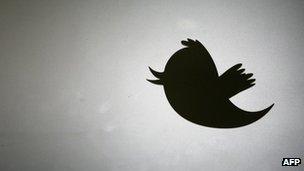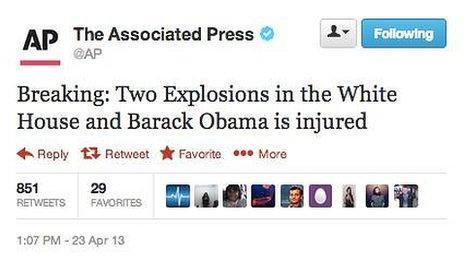A market-moving fake tweet and Twitter's trust issue
- Published
- comments

Is this the way the world will end, with neither a bang nor a whimper, but a tweet?
A fake tweet, from the hacked account of a news agency, external, wiped $200bn (£131bn) off the New York Stock Exchange. It had claimed there had been two explosions at the White House, and President Obama had been injured.
It was quickly disclaimed and corrected, but some damage had been done.
The Wall Street Journal says much of the stock market reaction, external was down to automatic scanning of news sites, and instant adjustments. But I am not sure human traders would have been very much better than their machines at showing caution and not panicking.
It does show how central Twitter has become to our world.
Ever since news has been broadcast on the radio it has been possible to get information in real time - but you don't carry a radio with you everywhere, or check it all the time.
Lies and truth
The addictive nature of Twitter makes it a powerful tool - and one without boundaries. Lies and truth appear without anyone trying to filter. Not that they should, but it puts a responsibility on the consumer.
Last week the Boston police did not tour the streets in a car and use a megaphone to tell residents of Watertown to stay indoors.
They tweeted it. They tweeted the end of the manhunt too, terse and triumphant. Amid this accurate information straight from the most important source, there was a lot of dross. The problem Twitter presents is how people filter it, and how much they trust it.
Dr Herb Lin, a cyber security expert, says media agencies are likely to make security changes to their Twitter account
There is a danger Twitter itself becomes what is trusted, when it is only a publisher - you have to look to who is saying what. In one sense that is no different to going to a newsstand and choosing to buy one newspaper over another.
But it is different in scale - Twitter bombards, at least if you choose to subscribe to a wide range of people.
It is hugely valuable. My teenager daughter regards it as rather for losers - those who want to babble about what they had for breakfast.
When I first heard about it I thought much the same. Now it is probably the sixth thing I check in the morning. It is important for breaking news, fascinating for recommending articles and blogs I wouldn't have otherwise seen.
But lies and truth appear side by side. Not that there should be a filter, but it makes it all the more important people are more sophisticated, more discriminating.
As a journalist, I've long been irritated when people tell me: "They say…" "Who is the 'they' I ask? The BBC? The police? The government? The National Enquirer? The tabloid press?"
But for many it is an amorphous authority, the juiciness of the information more important than the veracity.
Twitter is indeed a powerful tool, and like all such instruments has to be treated with respect and caution.
- Published24 April 2013
